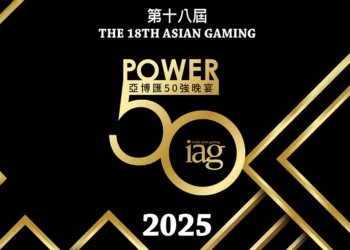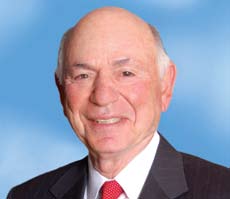 11 (-) Michael Leven
11 (-) Michael Leven
President and COO
Las Vegas Sands Corp
“You can win the war,” as Michael Leven is fond of saying, “but you have to win the peace.” That’s a challenge when your boss is Sheldon Adelson. Mr Adelson may not be a warmonger, but he certainly doesn’t shrink from conflict if it comes his way.
If anyone has come close to winning the peace on behalf of Sheldon Adelson and Las Vegas Sands Corp, it’s Michael Leven. Since becoming group COO at a time of some existential peril for LVS in the spring of 2009, Mr Leven has made the most of lulls in the company’s respective battles for stability, political credibility and global dominance. He’s used those moments to reach out to governments, investors, contractors and company staff to explain that LVS is not the corporate version of ‘Shrek’ it is portrayed as in some sections of the media. Importantly, Mr Leven’s message tends to be well-received because he is widely trusted for his integrity. Mr Adelson may have said it best in a statement issued on the occasion of Mr Leven’s two-year contract renewal last November: “He is a real gentleman.”
Mr Leven’s track record may speak for itself in the industry, but it’s worth reminding ourselves of some of the highlights. They include: the Marina Bay Sands and Sands Bethlehem openings; Sands China’s US$2.5 billion IPO; several billions of debt paid down or refinanced; fresh momentum injected into Cotai via partnerships with Hilton Worldwide, Intercontinental Hotels Group and Starwood; a 10-year deal struck with InterContinental to cross-market The Venetian and Palazzo in Las Vegas with IHG’s 180 million-strong database; and last but not least, management stability largely restored at the corporate and property levels.
All this has occurred in the space of two-and-a-half years and, more remarkably, in the absence of any direct gaming industry experience. Mr Leven is a veteran hotelier—a former president of Days Inn and Holiday Inn Worldwide, and a founder of the company that developed the Microtel and Hawthorne Suites brands. Mr Leven and Mr Adelson have known each other for decades—from the days when Mr Adelson was operating charter tours.Later, when Mr Adelson owned Comdex, a global organizer of computer trade shows, and Mr Leven was running Days Inn, they’d meet occasionally for dinner. Mr Leven declined an offer to run the old Sands when Mr Adelson bought the famed Las Vegas Strip resort in 1988. But when Mr Adelson took Las Vegas Sands Corp public in 2004, Mr Leven accepted a seat on the board of directors and served for about a year.
More recently, Mr Leven has been occupied in juggling three roles: strategic global management; keeping the Macau operation ticking over as interim CEO of Sands China (until the internal promotion of Ed Tracy from Sands China COO in July); and improving the corporation’s and local unit’s sometimes fraught relationships with the Macau government. The latter was especially important in the wake of last year’s ugly fall-out from the court battle between LVS and sacked Sands China CEO Steve Jacobs. Allegations made by Mr Jacobs claiming that LVS ordered background investigations into members of the Macau government—while strongly denied by the company—threatened to taint the Macau operation. That in turn threatened a negative impact on Sands China getting all the construction workers, resort staff, table games approvals and land rights it needs to realise fully its grand plans for Cotai. A close second to cultivating government ties was to improve relationships with the Macau junket operators to move Sands China up the VIP market share league table.
LVS has learned “a lot over the last six or seven years,” Mr Leven has been quoted as saying.
“If we made mistakes in the past, I can tell you that we won’t be perfect. We’ll probably make some more mistakes in the future,” he added. With Mr Leven in the wheelhouse, there should be a reduced risk of navigational errors.
 12 (11) Linda Chen
12 (11) Linda Chen
Chief Operating Officer Wynn Resorts (Macau)
Director Wynn Resorts Ltd
Most people will tell you that if you want to get to Steve Wynn on Macau issues you need to go through Linda Chen. Among her core responsibilities are heading up marketing and strategic development, and it is said she has not only the chairman’s ear but his complete trust. Mr Wynn values her so highly that in 2010 the company bought a US$5.4 million house in Macau for her use according to an SEC filing in March. Her standing is only likely to rise as the company looks to expand with a second Macau resort—on Cotai.
While women are generally under-represented in the upper levels of management in Asian gaming markets, Ms Chen has some notable company in top jobs. They include Pansy Ho at MGM China and STDM, Angela Leong at SJM Holdings and Constance Hsu at Mocha Clubs. All are listed elsewhere in this edition of the Asian Gaming 50. Another rising name is Li Wing Sze, who oversees gaming operations in Macau for junket consolidator Amax Holdings. But none of these women can yet claim the breadth of experience and institutional knowledge that come with having worked in Las Vegas marketing. Ms Chen can.
Ms Chen and Mr Wynn go back a long way. Indeed, she was an eyewitness to the founding of the new Las Vegas, having been involved in opening The Mirage in 1989 and MGM Grand in 1993. She worked with Mr Wynn on the opening of Bellagio in 1998 and served as executive vice president of international marketing. She stayed on at MGM Mirage through 2002 as executive vice president international marketing, before rejoining her former boss in the run-up to the opening of Wynn on the Las Vegas Strip. She currently serves as a director of Wynn Resorts and president of Wynn Marketing, responsible for international marketing operations at the Vegas properties.
Ms Chen holds a B.S. from Cornell University’s prestigious School of Hotel Administration and has studied at Stanford’s Graduate School of Business. She’s also cultivated connections in her homeland, mainland China. She’s a member of the Nanjing Committee of the Chinese People’s Political Consultative Conference (Macau).
Following the successful opening last spring of the US$600 million Encore at Wynn, she was rewarded with a new 10-year contract. Employment agreements of such duration are rare in any industry, and this one stands as a powerful statement of the confidence in which Ms Chen is held by Mr Wynn, Wynn Resorts and the board.
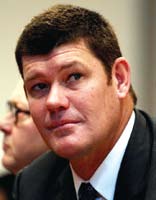 13 (8) James Packer
13 (8) James Packer
Co-Chairman
Melco Crown Entertainment
Three events this summer should dispel doubts about whether James Packer is in Macau for the long haul.
First there was the announcement in June that Melco Crown Entertainment, his joint venture with Lawrence Ho, had acquired a majority stake in the unfinished Studio City resort (formerly known as Macao Studio City) on Cotai for US$360 million. Second, in early August the company confirmed its intention to pursue a dual listing of its shares—adding Hong Kong Stock Exchange membership alongside its Nasdaq membership—by the end of a year. That process is expected to include a US$400 million-US$600 million initial public offering (IPO) in Hong Kong. Third, on 25th August, MPEL announced second-quarter earnings that pleased the markets—a US$97 million reversal of last year’s net loss, on EBITDA that nearly quadrupled to US$216.3 million.
These facts may explain why Mr Packer was keen to go on record denying he planned to sell his 33.4% investment in Melco Crown to fund a takeover of Australia’s Echo Entertainment Group—the Tabcorp Holdings spin-off consisting principally of Sydney’s Star City and Jupiters Hotel & Casino on the Gold Coast and two other Queensland casinos. Referring to Crown Ltd’s relatively small 4.9% equity participation in both Tabcorp and Echo, Mr Packer’s publicly-traded Australian flagship issued a terse statement in June stating it: “has no intention of increasing its interest in either company”.
It would certainly be surprising to many if Mr Packer decided to relinquish his sizeable interest in Macau—the largest and fastest-growing casino market in the world—in favour of more exposure to the Australian market. Echo Entertainment has undoubtedly been busy working to expand the overall size of the Australian gaming market by bringing in high rolling Asian customers (it has deals with several Asian junket operators including Neptune Group in Macau). It is also energetically improving its product. This year, Echo began a A$1.6 billion revamp of its four venues. But even that sterling effort is unlikely to produce the volumes of play and levels of profitability available in Macau. That’s the case even though the states of Australia all have VIP gaming tax rates lower than the 39% imposed across the board in Macau.
Crown’s Australian properties, Crown Casino Melbourne and Burswood Entertainment Complex in Perth—first-class gaming resorts by any standard—delivered results for the year ended 30th June that the company described as “mixed”. It was the US$34.9 million that Crown realised on its Macau investment that helped swing the company to a 15% increase in net profit. Crown is now trying to improve the future performance of the Australian operation by spending more than US$1 billion in debt financing on refurbishments and improved marketing at home.
In Macau, the MPEL joint venture has recently localised its management. That has coincided with an improvement in financial performance. The 67% increase in net revenue MPEL posted in the second quarter (US$960 million) speaks to a steady upward trend in VIP volumes at City of Dreams (CoD) on Cotai and Altira Macau since last year. Mass-market performance has also improved. In 2Q, casino drop was up 59% at CoD. At Altira it nearly doubled, though admittedly from a low base as Altira was conceived and continues to be marketed as a specialist property for high rollers. Non-gaming revenue at CoD was up 69%—suggesting the resort is succeeding as an all-round tourism destination. Mr Packer’s other gaming investments—Crown, Betfair Australasia, the Cannery Casino Resorts in the United States and the Aspers Group in the UK—can’t compete with Macau’s performance.
One question raised by commentators is how dilutive any Hong Kong IPO will be for existing MPEL shareholders. Based on recent prices, the Nasdaq-listed stock has soared in value by more than 200% in the past year. The markets’ positive reaction to MPEL’s US$1.2 billion refinancing earlier this year—when 13 banks took part—suggests investors are expecting more upside to come. The bulls should continue to run once earth is moving again on the Studio City site.
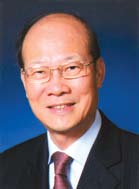 14 (-) Ambrose So
14 (-) Ambrose So
Executive Director and CEO
SJM Holdings
To find Dr Ambrose Shu Fai So, you need only look in the right places. Those places are wherever SJM needs to be in order to cultivate goodwill and show appreciation. It’s payback for the exalted position that STDM and latterly SJM have held and the handsome profits they have made over half a century of business in Macau. The right place could be at a reception for a politician visiting from the Chinese mainland. Or it could be at one of the high-profile sporting events that SJM sponsors, perhaps a charity fund-raiser, or the presentation of the scholarships the company awards every year.
And where there’s a right place, there’s also a right sound bite. Some observers regard Dr So’s comments as often bordering on the Delphic—i.e. hinting at something without actually saying it. But it always pays to listen closely. Dr So chooses his words with precision and is probably one of the best-informed gaming executives in Macau—specially now that his boss, Dr Stanley Ho, has retired.
When the discussion turns to developments at Ponte 16, Hengqin Island or SJM’s plans for Cotai, and the occasion calls for the right quote, he’s at the ready. He’s the one hosting the SJM quarterly earnings calls with such serene comprehension. His personal passion is Chinese calligraphy, a most civilised and exacting of arts; one that requires infinite patience, a meticulous eye and a steady hand. Dr So is an acknowledged master. It speaks to the true measure of his power, which is that you hardly notice him wielding it.
The gambling empire founded by Dr Ho and his original partners ended 2010 with eight consecutive quarters of revenue and EBITDA growth. Through the first half of 2011, SJM’s core properties (Casino Lisboa, Grand Lisboa, Oceanus and Jai Alai) and its 14 satellite casinos together accounted for one-third of Macau’s gross gaming revenues (GGR). SJM has to share the spoils from the satellites with the management of each of the satellite properties as they are SJM-licensed but owned by other parties. Nonetheless, SJM’s grip on the general market and the high growth VIP market still looks powerful. SJM had 38% of mass GGR and 30% of VIP during the relevant period. EBITDA was up 56% to HK$3.49 billion on a 41% increase in win to HK$37.53 billion. The company brought 48 HK cents per share to the bottom line, a 62.5% increase year over year. Its 17 casinos are on track to break HK$70 billion in win during the year.
Yet, for all that shareholders are reaping from the CEO’s managerial know-how (Dr So holds a doctorate in the field) and his decades of experience catering to the most voracious gamblers in the world, it’s been his unflappable demeanour, as much as anything, that has added value to SJM’s market position.
The sure, subtle brush strokes of calligraphy and diplomacy, the tall, bespectacled presence, part-businessman, part-scholar, that has calmed investors through some very rough seas and kept them on board. Those investors have made their gratitude known. The stock was trading, in the week IAG went to press, at better than 22 times earnings on a trailing 12-month basis and climbing back toward its 52-week high — and this not six months after trading in the shares was suspended in the wake of that nasty public feud within the Ho clan for control of STDM-SJM.
Dr So performed basically the same critical function when during 2007 and the first half of 2008 Dr Ho’s sister Winnie Ho obstructed SJM’s planned initial public offering in Hong Kong. Through months of seemingly interminable court battles, he kept his nose trained on the finish line. When the day finally came in the summer of 2008, a year late and on the brink of a worldwide financial meltdown, it was Dr So standing at Stanley Ho’s right at the Hong Kong Stock Exchange.
Earlier this year, once the dust settled for control of the casino empire, Dr So wasn’t hard to pick out. At that point, he was already long gone from Shun Tak Holdings, having resigned in 2009 after 18 years as a director, officially to “devote more time” to [his] own business.
His diplomatic as well as business skills have helped to make him at 60 years old a very wealthy man, one of only four executives of SJM Holdings who were awarded stock (Dr Ho’s fourth consort Angela Leong On-kei, COO Louis Ng and long-time legal advisor Rui Cunha were the others). In the most recent round of option allotments, announced in March, Dr So’s was the largest, at 35 million shares. He chairs the board’s two key committees: Nominations and Remuneration.
As for the political game, which is paramount in Chinese affairs, he’s played it with aplomb. He is a member along with Stanley Ho of the prestigious National Committee of the Chinese People’s Consultative Committee. He is a member of the S.A.R.’s Economic Development Council. He is the honorary consul of Portugal in Hong Kong. His cultural, educational, scientific and community activities are too numerous to list. His calligraphy has been featured in a set of stamps issued by Macau Post and has been the subject of solo exhibitions in Macau, Hong Kong, Shanghai and Taiwan. It is part of the collections of the University Museum and Art Gallery of The University of Hong Kong, the Art Museum of Princeton University and the U.S. Library of Congress.
This is a man for all seasons, and as Stanley Ho has known through the years, the ablest of seconds. If the smart money is correct and SJM Holdings is now Ms Leong’s to lose, she must know this as well.
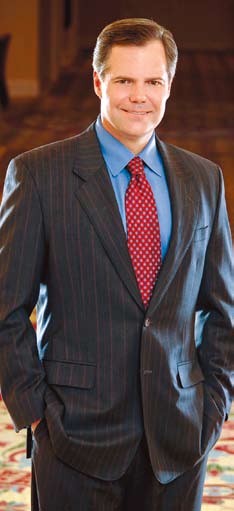 15 (22) Jim Murren
15 (22) Jim Murren
Chairman and CEO
MGM Resorts International
While no one is mistaking June’s US$1.5 billion listing of MGM China Holdings as an outpouring of confidence in the parent company’s ability to right its debt-laden balance sheet any time soon, it may well prove instrumental propelling that effort forward.
Jim Murren didn’t attend the listing ceremony at the Hong Kong Stock Exchange, but his hand was evident in ensuring the IPO would be priced at the top of its prospective range. His influence could also be detected in the share restructuring that attended the birth of the new Macau-focused public company. MGM Resorts now has 51% of MGM China and operational control of its prime asset, the casino at MGM Macau and its 430 or so table games and 1,000 electronic gaming machines. MGM China has also prepared plans for a second Macau resort on Cotai, said Grant Bowie, the unit’s Chief Executive, in July. In the same month, MGM China’s Chairman Pansy Ho said the company was also interested in investing in Taiwan’s hospitality and tourism sectors, though didn’t specifically mention the Taiwan government’s plan for a casino resort on one of several outlying islands.
Under the restructuring of the Macau business that accompanied the June IPO, Mr Murren was able to secure a non-compete agreement with MGM’s original 50% Macau joint venture partner Ms Ho. In other words, Ms Ho will continue to lend her political and business clout to MGM’s Macau story, but won’t step on the Las Vegas giant’s toes by competing with it in Asia via her other business interests at STDM (the tourism investment company founded by her father) and Shun Tak, a shipping and property conglomerate also started by Dr Ho and run by Ms Ho as managing director since 1999.
In the meantime, MGM Resorts International gets to continue leveraging its still-stressed domestic balance sheet against earnings from Macau—the largest and fastest-growing gambling market by gross gaming revenue in the world. It’s an indication that despite what some in the industry regard as his mistake in pressing ahead with spending US$9.2 billion on Las Vegas real estate in a weak US market, Mr Murren has at least grasped the big picture on Asia. His strong suit is finance. He was the executive who engineered the multibillion-dollar mergers that made MGM the dominant operator on the Las Vegas Strip. That strategy also tied MGM’s fortunes strongly to the US economy. The company is now more dependent on the sometimes precarious health of US economic recovery and growth than some investors are comfortable about.
His limited experience on the operations side explains in part why one of the industry’s largest multi-property companies was slow in creating a comprehensive marketing network along the lines of Harrah’s/Caesars Entertainment’s Total Rewards. But there are positive global implications to the rollout of the M Life rewards program over the last year, and these will become more apparent when it’s time to cross-sell MGM Macau with the Ho Tram beachfront gaming resort complex under construction on Vietnam’s southern coast. A joint venture between MGM’s leisure development subsidiary, MGM Hospitality, which has branding rights and management control, and Vancouver-based Asian Coast Development, which is funding and building the project, Ho Tram is pretty much pure upside for MGM. It represents one of the more potent examples of Mr Murren’s strengths as a strategic thinker.
Taking a majority stake in MGM’s Macau operation via MGM China is likely to prove to be another astute move. The casino generated US$309 million in EBITDA through the first half—US$170 million of it in the second quarter. To put that in perspective, the company’s CityCenter project in Las Vegas earned US$64 million. As a single property, MGM Macau consistently trails the competition in GGR, but efforts to get its VIP segment on track appear to be bearing fruit. Casino revenue nearly doubled in the first half to approximately US$1.2 billion thanks in large part to a 125% increase in VIP win. A number of high—end villas on the top floors of the hotel tower have been converted into VIP rooms, and more high-roller tables will be deployed on the casino’s second level in the months ahead, together with the second of two lounges on the main floor targeting what the property calls the “premier mass market”.
The fourth quarter will see another piece of the Asian strategy fall into place with the opening of MGM Hospitality’s MGM Grand Sanya, a 675-room non-gaming luxury hotel on China’s Hainan Island in the South China Sea. But the parent company remains very much a US-focused concern. The challenges it faces in reducing its US$12.6 billion debt load—including the need to ramp up performance at CityCenter and to resolve a number of thorny post-construction issues there—will consume much of Mr Murren’s energy into the foreseeable future. His Wall Street background (he was director of research and managing director for Deutsche Bank prior to joining MGM in 1998 as chief financial officer) has served him well to date, bolstering his ability to keep lenders onside and thus buy time for Las Vegas to wait out persistent weakness in the national economy. But ‘too big to fail’ has its limits as a concept, as Mr Murren is well aware and the former investment bank Lehman Brothers found out. In Asia, Mr Murren is building solid financial foundations to ensure that the MGM Resorts International corporate edifice—unlike the unfortunate Lehman Brothers bank—can withstand any further global financial earthquakes.
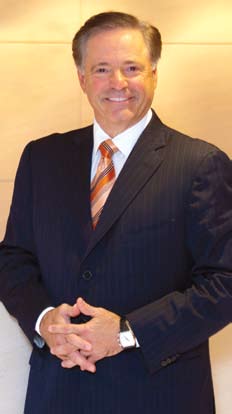 16 (-) Michael Mecca
16 (-) Michael Mecca
President and COO
Galaxy Entertainment Group
Galaxy Entertainment Group (GEG) has entered the second half of 2011 with a dazzling new Cotai resort in its portfolio and a shot at overtaking SJM for leadership in Macau in gross gaming revenues. It’s a combination of happy circumstances that ensures Galaxy’s President and COO Michael Mecca makes the top 20 of the Asian Gaming 50 – 2011.
The mid-May opening of the HK$16.5 billion, 550,000-square-meter Galaxy Macau catapulted the company to a record second quarter and record first half, highlighted by an 84% year-on-year increase in pre-tax earnings for the six-casino group on gaming revenues that were up 60% over the same period. EBITDA hit HK$1.1 billion (US$143 million) in the second quarter on a 72% jump in gross gaming revenues (GGR). It was GEG’s 11th quarter in a row of earnings growth.
Galaxy’s Chairman Dr Che-woo Lui professed himself “delighted” with the results. Mr Mecca, who got Galaxy Macau opened on time and only slightly over budget, had to be feeling pretty good as well. The resort was a major contributor, delivering HK$376 million (US$49 million) to group EBITDA in less than seven weeks of operation, and without its full complement of 2,200 hotel rooms, prompting Cotai rival Michael Leven of Las Vegas Sands Corp to declare the property a “formidable competitor”.
Las Vegas veteran Mr Mecca has the entire group sparking on all cylinders. StarWorld Hotel and Casino’s HK$1.3 billion in first-half EBITDA and HK$10 billion of GGR both set property records. EBITDA at the property has grown in every quarter since Mr Mecca joined the company in March 2009. The group’s City Clubs division (Grand Waldo, President, Rio and Waldo) posted 2Q and 1H EBITDA increases of 20% and 53%, respectively, to HK$49 million and HK$106 million.
Galaxy followed up in July by moving squarely into second place behind SJM on the Macau market share list, posting HK$4.3 billion in GGR, of which StarWorld contributed HK$2.1 billion and Galaxy Macau HK$1.8 billion, with VIP play accounting for the vast majority of it (approximately 93% excluding slot revenue at StarWorld, and roughly 81% at Galaxy Macau). Mr Mecca, despite a background centred principally in the US mass market, has managed the highend trade well. His watch has coincided with a VIP hold rate at StarWorld in line with industry averages (2.9%) while beating the average at Galaxy Macau (3.5%). Property-wide operating margins of 23% and 22%, respectively, point to efficiently run gaming floors across all market segments.
Mr Mecca joined Galaxy from Planet Hollywood, Las Vegas, and held senior executive roles at Mandalay Resort Group, Caesars World, Crown and Station Casinos, the largest operator in the Las Vegas ‘locals’ market.
He was hired “to take Galaxy to the next level,” in the words of Galaxy Vice Chairman Francis Lui. It appears the company has chosen well.
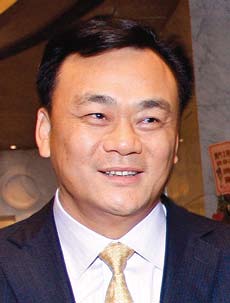 17 (12) Jack Lam
17 (12) Jack Lam
Chairman
Jimei Group
Dr Jack Lam can’t boast the public profile of a Steve Wynn or Sheldon Adelson. But the role he has played in the growth of Macau’s VIP baccarat market—and therefore Macau’s rise to number one casino market in the world by revenue—shouldn’t be underestimated. Dr Lam straddles the divide between ‘old’ monopoly-based Macau as it was until 2002, and ‘new’ multi-operator Macau with its earnings conference calls, gleaming hotel towers, spas and wave pools.
Dr Lam first started working as a representative of a small Macau junket in 1981—back in the days when most high rollers were businessmen from Hong Kong. In the years since then he has gone independent and ‘gone global’—or at least regional—with investments including a casino cruise ship—the M.V. Jimei—operating from Hong Kong, and casino resorts in the Philippines as well as VIP rooms in casinos all over Macau. His junket business Jimei has been able to take commercial advantage of the Western operators’ hunger for Chinese VIP business and their initial inexperience of the intricate Macau junket system, thus making a good living from supplying this essential component of the Macau market.
Jimei is one of the largest VIP operators in Macau. It has high-limit rooms across the territory, including at SJM’s Grand Lisboa, and SJM-licensed L’Arc; at Wynn Macau, MGM Macau and Sands Macao, all on Macau peninsula; at Altira Macau on Taipa and at City of Dreams on Cotai.
In 2008, Jimei took over the old Mandarin Oriental Hotel next door to Sands Macao, rebranded it as Grand Lapa, and opened an entire high roller casino of its own—Jimei Casino—under an SJM operating licence.
If Dr Lam straddles the gap between old Macau and new Macau, he also understands that the junket trade is evolving rapidly, in terms of its capitalisation, development of margins, customer service and also in its engagement with external scrutiny and controls. Chief among these changes is a process of ‘corporatisation’ where junkets are taking on more of the management techniques and controls of modern financial services—such as formal monthly statements of account for players. Some cynics think this is largely window-dressing. They would argue that in the end what underpins the credit-based gambling system in Macau is that if a player can’t or won’t pay they will have to be leaned on quite heavily by someone somewhere. The junkets’ counter-argument is that their high-volume but low-margin business means they covet their liquidity. Bad debt is simply bad business, they say. Any theoretical junket working with agents or sub agents that have to consider physical intimidation of debtors has actually failed in its risk management, they argue.
The licensed junkets further argue that rare violent incidents such as false imprisonment, kidnapping and, on occasions, murder happen only in the murky world of unlicensed, freelance moneylending—aimed at clients who wouldn’t be able to get credit lines at regulated casino junkets. Don’t blame the whole ‘reef’ for the fact that sharks can sometimes be found in the ecosystem, say the licensed junkets. The same thing can happen in Las Vegas, they point out.
WikiLeaks cables and lurid newspaper headlines notwithstanding, the US-based operators in Macau have been under pressure for some time from their home regulators to ensure as much transparency as possible in their dealings with Chinese junkets. Some operators such as Sheldon Adelson, Chairman of Las Vegas Sands Corp, has made no secret in the past that he would like to dispense with junkets where possible—though recently he has been more conciliatory toward them after his Macau VIP market share fell.
Dr Lam’s response to change in the junket business is to move with the times, in terms of improving the marketing of the business and improving the professionalism of its accounting and auditing. He has also developed strategic relationships within the Macau segment. He recently joined forces with Macau junket organiser CCUE to buy Neptune Group’s casino cruise ship. Jimei and CCUE will jointly market the ship to their respective casino customers in Macau and beyond. Jimei has also shown some interest in acquiring a Singapore junket licence. The stringent requirements set by the Singapore authorities regarding licensing and personal and corporate financial disclosure, however, leave doubts as to how many of Macau’s licensed junkets would pass muster.
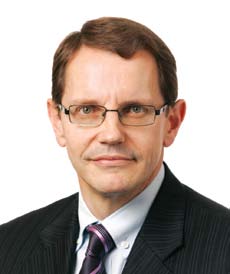 18 (27) Andrew MacDonald
18 (27) Andrew MacDonald
Executive Vice President, Casino
Marina Bay Sands
The fact Marina Bays Sands (MBS) is neck-and-neck with Resorts World Sentosa (RWS) in Singapore in the battle for gross gaming revenue is in part a tribute to Andrew MacDonald’s casino management capability. In theory, RWS—operated by one of Mr MacDonald’s former employers, Genting Group, a Malaysian Chinese company—should have the kind of competitive advantage in understanding its customers that Galaxy Entertainment Group and SJM Holdings arguably have in Macau over some of their Las Vegas-based rivals.
Mr MacDonald’s achievement in helping to tame the ‘local’ competition is all the more impressive given that MBS has had less continuity in its senior management team than has RWS.
Sixteen months in, Mr MacDonald is already reporting to his second CEO. His first casino marketing boss is also gone. The property also has a new chief operating officer. Yet the casino business Mr MacDonald has helped build over this time has far surpassed the most bearish projections for the market, and come close to some of the most bullish.
At US$5.5 billion, MBS is the second-most expensive gambling resort ever built. (The most expensive is MGM Resorts International’s CityCenter in Las Vegas, which came in at US$9.2 billion and nearly cost that company its life.) MBS was one of the hardest casino projects—technicallyspeaking—to finish. Its architectural daring was a problem by itself. No-one had ever attempted to put a deck with that size and weight of park and swimming pool on not one but three skyscraper towers before. The reclaimed land on which MBS sits also proved harder to stabilise than at first had been hoped. Added to that were headaches related to leaps in commodity prices and local materials shortages in an economic boom, followed by a squeeze on the company’s global liquidity in a world-wide economic bust. That was the background to the project when in December 2009, Mr MacDonald, a 30-year casino industry veteran, left a plum job in New York with investment bankers Macquarie Capital Advisors, to return to his first love—managing casinos.
By 1st July 2011, Mr MacDonald’s gambling floor was entering the third quarter with arguably the most profitable gaming inventory that LVS owns. The property’s EBITDA nearly doubled from the first quarter to a company-best of US$405.4 million on net revenues of US$737.6 million—80% of it driven by the 600-plus table games and about 2,400 slot machines and electronic table games. Never mind that Marina Bay Sands has only one competitor in the market, as opposed to dozens in Macau, and much lower tax rates. Those rates in Singapore are 22% on the mass (15% gaming tax plus 7% Goods & Services Tax) and 12% on the VIP (5% gaming tax plus 7% GST). In Macau, there’s an effective rate of 39% (35% gaming tax and a mandatory 3% to 4% tax for social and welfare contributions).
Win per table at US$11,185 at MBS was second only to The Venetian Macao, with roughly the same number of tables. Slot win at US$611 per unit was nearly three times greater than The Venetian Macao and second only to the Plaza Casino in LVS’s The Four Seasons Macao, which has about the same number of machines.
The operating margin—calculated on earnings before tax—came in at a whopping 55%. Through the first half of 2011, Marina Bay Sands’ 52% EBITDA margin was the highest in the company (the Macau properties ran at a combined 33%, the company as a whole recorded 37%). During that time, MBS generated 29 US cents of every US dollar Las Vegas Sands netted and 41 US cents of every US dollar of EBITDA.
Tellingly, MBS’s contribution to the LVS bottom line comes without the benefit of VIP junket operations, which generate something like 75% of gaming revenues in Macau. LVS says it will continue to run MBS without them. Of course, this could change when its rival on Sentosa Island gets its first junket partners through the Lion City’s stringent licensing review; assuming they do get through. That may well be when Mr MacDonald faces his greatest test to date.
Sceptics might argue that Singapore’s casinos can’t miss, no matter what management team is sent out onto the field. But no one disputes the value of Mr MacDonald’s experience. He came up through the Australian industry, starting as a dealer in Tasmania, moving up the ranks into upper management in Adelaide and at Hilton’s Conrad Jupiters in Queensland and with the Packer organization, and he knows the regulatory side, having served in the Casino Control Divisions of Queensland and New South Wales. Before joining Macquarie he was executive vice president-Gaming at Malaysia-based Genting, parent company of Resorts World Sentosa.
So far at Marina Bay he has proven expert at managing risk and credit at the premium-play level while delivering a product that also hits it big with the mass market, outshining RWS in the last reporting period in terms of operating efficiency and snatching a 56% market share. Given the revolving door of casino senior management, that’s a talent worth holding on to.
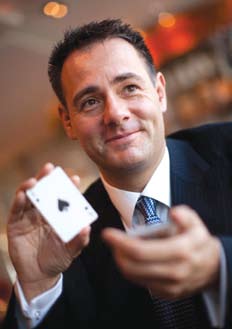 19 (18) Tom Hall
19 (18) Tom Hall
Business Development Director
Sunplus
Tom Hall heads global business development for Sunplus. The company is a software developer with deep roots in Asia’s highly sophisticated and competitive sports betting markets. It now has ambitions to take its leading-edge technologies worldwide.
Mr Hall is recognised as one of the world’s experts on interactive and online gambling. He came to Sunplus earlier this year from AsianLogic, which he co-founded and helped build into one of the Asia-Pacific region’s largest providers of Web gambling and betting services. He still serves as AsianLogic’s vice chairman. Previously, he served as Group CEO for Playtech, the world’s leading provider of ready-to-use technology for online casinos including software, hosting, customer service and transaction management. At Playtech, Mr Hall was responsible for overseeing customer growth and the development of customized software for Asian markets. No one is more familiar from an operations standpoint with the preferences of the region’s sports bettors. He understands the need for bookmaking and book management skills that can cope with high betting volumes, large individual bets and, in particular, Asian gamblers’ favourite—‘in-play,’ (also known as ‘in-running’) betting. Such play—gambling on propositions derived from any number of possible outcomes during the live action of a game—may constitute 80% by volume of Internet betting in Asia, according to some industry estimates.
Currently, in-play betting is not so widespread in the rest of the world. In the large and lucrative jurisdictions where online betting is legal in Europe, it accounts only for an estimated 30% of bets. The reason seems to be that European companies are not keen to take on the high risk and small margins typically considered acceptable by Asian bookmakers. Mr Hall is determined to change that outlook, for the benefit of gamblers and bookmakers alike.
In-play betting shares many of the complexities of financial market trading. Indeed, that’s where the technology to manage in-play betting was pioneered. It’s not too fanciful to say that it’s Web gambling’s version of rocket science. Sunplus’ products and their back of house support have the ability to receive and instantaneously process, price and pay off on tens of thousands of decisions on the fly in response to second-by-second shifts in fortune across thousands of events at the same time.
Taiwan-based Sunplus has spent the better part of the last decade under various trading entities refining a sophisticated and robust software platform which Mr Hall believes will translate the high octane, relatively high-risk Asian Internet gambling business model into something providers everywhere can offer affordably and profitably. The smaller books are an especially ripe market, as he sees it, as are portals that would like to add sports betting to their menu. Many online gaming providers fall into the latter category.
ONEBook, the latest iteration of the Sunplus platform, is handling in a typical month more than 18,000 live markets across more than 5,000 in-running soccer games and an additional 1,800 in-running events and 3,000 markets in 29 other sports. It posts and pays odds in five different formats (US-style odds are on the way). It speaks eight languages (with German, Italian and Romanian being added to support Mr Hall’s march into continental Europe). There are significant upfront costs in establishing a sophisticated bet management system. But once it’s running and handling large volumes of transactions—up to 150,000 bettors simultaneously have been handled in Asia at peak times—economies of scale come into effect. That means the cost per transaction is significantly reduced as compared to traditional Western bookmaking, where the operator manages the customer rather than managing the price.
Mansion88, Fun88, IBCBet, Bodog88 and AsianLogic are already using ONEBook, and its popularity is expected to surge as the ‘global village’ for live events continues to expand and the consumption of mobile technologies increases. Mr Hall is looking forward to taking Sunplus ‘on the road’ in 2011-12 and beyond.
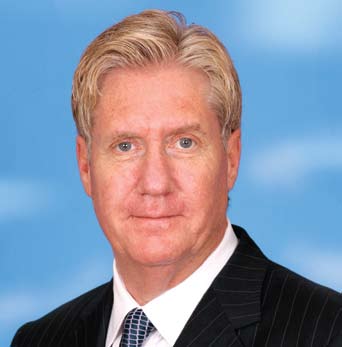 20 (-) Edward M. Tracy
20 (-) Edward M. Tracy
CEO
Sands China
Being the CEO of Sands China must be one of the best but also the most challenging jobs in the global casino industry. Ed Tracy will currently know how that feels after being promoted to the role in July from his previous post as President of Sands China.
The Sands China CEO job is one of the best in world gaming because it’s a once-in-a-career opportunity to have operational control of one of the biggest and most expensive collections of gaming and entertainment infrastructure that the world has ever seen. And all that in the biggest casino market by gross gaming revenue ever recorded. It must also be challenging, however, because you have a tightrope walk to balance the development and preservation of good relations with the Macau government, with the protection of your bosses’ and shareholders’ interests. LVS’s relationship with Macau officials has been fraught at times over the past three years, but appears to be better lately. And while Mr Tracy is working assiduously to keep things that way, he also potentially has the scrutiny of the United States’ federal authorities back home to think about.
But then these kinds of jobs are never meant to be career-long. They are precisely designed to be high octane, rollercoaster rides for focused high-achievers. Therein lies the risk but also the reward. In the case of Las Vegas Sands Corp—the parent company responsible for remuneration policy—that usually includes stock options as well as a handsome salary with the role and for a select group of other executives below group board level.
There’s a story—possibly apocryphal—that another senior member of the Sands China management was asked recently why he was still living in a hotel and hadn’t moved into a house or apartment in Macau. The story goes that the executive smiled and replied he didn’t think it was worth the time and effort. The implication seemed to be that the executive’s shelf life might be shorter than any accommodation contract. Certainly if two recent examples are anything to judge by, Mr Tracy will be able to consider himself well-satisfied if he makes it to his second anniversary in the role. His predecessor-but-one, Steve Jacobs, was fired for what the company described as “cause” after just under 15 months. That was despite guiding the Macau operation through the global financial crisis of 2008-09 and a highly successful flotation on the Hong Kong stock market. Mr Jacobs is currently attempting to sue Sands China via the Nevada courts for what he claims is wrongful dismissal. Tom Arasi, the first CEO of Marina Bay Sands, LVS’s casino resort in Singapore, resigned in January after 18 months in that post. And it won’t be lost on Mr Tracy that he wasn’t first choice for the Sands China CEO role. Michael Leven—the LVS President and COO who acted as caretaker CEO in Macau after Mr Jacobs was let go last summer—stated publicly in August last year that the company wanted “an Asian” for the Sands China top job. But after a year-long headhunting exercise—during which time Mr Leven regularly shuttled the 7,300 miles between Las Vegas and Macau as interim boss—it was decided that Mr Tracy’s good performance had earned him the right to a crack at the top Macau job. In the meantime, LVS hired an ex-Hong Kong government official to help further improve relations with Macau lawmakers and public servants.
Mr Tracy won’t have time to dwell about where he once stood on the candidate list. He faces an exceptionally busy schedule as the company approaches a possible spring 2012 opening for the first phase of Sands Cotai Central—LVS’s US$4.2 billion addition to its gaming and entertainment facilities on Cotai. He will also be working hard to ensure that as the company builds its impressive performance in mass-market gaming and entertainment, it also ensures it maintains and builds market share in the crucial VIP segment.
























